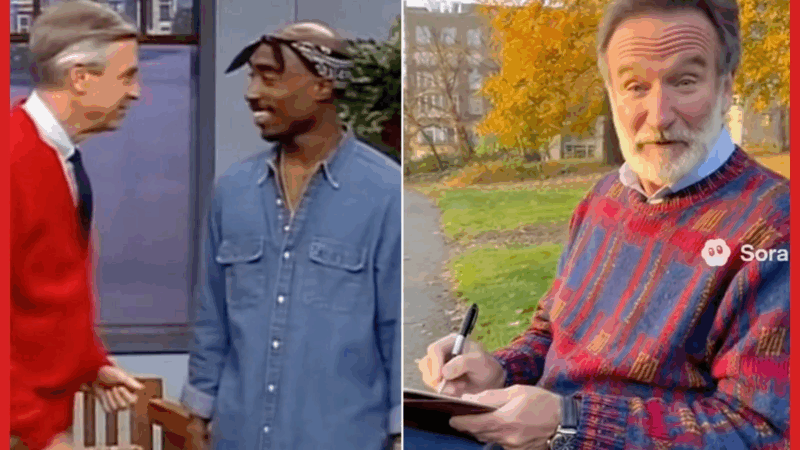Hollywood pushes OpenAI for consent
OpenAI says it has released new policies for an artificial intelligence tool called Sora 2, in response to concerns from Hollywood studios, unions and talent agencies.
The tool allows users to create realistic, high-quality audio and video, using text prompts and images.
“It’s about creating new possibilities,” OpenAI promised in a promotional video for Sora 2. “You can view the power to step into any world or scene, and letting your friends cast you in theirs.”
But with Sora 2, some creators have also made fake AI-generated videos of historical figures doing things they never did. For example, Martin Luther King, Jr. changing his “I Have a Dream” speech, Michael Jackson, rapping and stealing someone’s chicken nuggets, or Mr. Rogers greeting rapper Tupac Shakur to his neighborhood.
Some videos reimagined the late Robin Williams talking on a park bench and in other locations. His daughter Zelda begged fans to stop sending her such AI-generated content, calling it “horrible slop.”
“You’re not making art,” she wrote on Instagram, “You’re making disgusting, over-processed hotdogs out of the lives of human beings.”

“It’s kind of cool, it’s kind of scary,” says actress Chaley Rose, who’s best known for her role in the TV series Nashville. “People can borrow from actors, our vulnerability and our art to teach the characters they create how to do what we do. I would hate to have my image out there and not have given permission or to actually be the one doing the acting and having control over the performance.”
Hollywood’s top talent agencies first sounded the alarm.
“There is no substitute for human talent in our business, and we will continue to fight tirelessly for our clients to ensure that they are protected,” United Talent Agency wrote in a statement last week. “When it comes to OpenAI’s Sora or any other platform that seeks to profit from our clients’ intellectual property and likeness, we stand with artists. The future of industries based on creative expression and artistry relies on controls, protections, and rightful compensation. The use of such property without consent, credit or compensation is exploitation, not innovation.”
Creative Artists Agency issued a similar warning last week.
Last year, California’s governor Gavin Newsom signed a bill requiring the consent of actors and performers to use their digital replicas.
Now, the talent agencies and SAG-AFTRA (which also represents many NPR employees) announced they and OpenAI are supporting similar federal legislation, called the “NO FAKES” Act.
Until now, some of the videos created using Sora 2 have relied on copyrighted material. For instance, there’s a video that shows the animated character SpongeBob Squarepants cooking up illicit drugs.

The Motion Picture Association, which represents major Hollywood studios, said in a statement that since Sora 2’s release, “videos that infringe our members’ films, shows, and characters have proliferated on OpenAI’s service and across social media.”
Duncan Crabtree-Ireland, the national executive director of the union SAG-AFTRA told NPR last week that it wasn’t feasible for rightsholders to find every possible use of their material.
“It’s a moment of real concern and danger for everyone in the entertainment industry. And it should be for all Americans, all of us, really,” says Crabtree-Ireland.
SAG-AFTRA says actor Bryan Cranston alerted the union to possible abuses. Now, the union and talent agencies say they’re grateful OpenAI listened to such concerns.
The company has announced an “opt-in” policy allowing all artists, performers, and individuals the right to determine how and whether they can be simulated. OpenAI says it will block the generation of well-known characters on its public feed and will take down any existing material not in compliance.
Last week, OpenAI agreed to take down phony videos of Martin Luther King, Jr., after his estate complained about the “disrespectful depictions” of the late civil rights leader.
Homeland Security suspends TSA PreCheck and Global Entry airport security programs
The U.S. Department of Homeland Security is suspending the TSA PreCheck and Global Entry airport security programs as a partial government shutdown continues.
FCC calls for more ‘patriotic, pro-America’ programming in runup to 250th anniversary
The "Pledge America Campaign" urges broadcasters to focus on programming that highlights "the historic accomplishments of this great nation from our founding through the Trump Administration today."
NASA’s Artemis II lunar mission may not launch in March after all
NASA says an "interrupted flow" of helium to the rocket system could require a rollback to the Vehicle Assembly Building. If it happens, NASA says the launch to the moon would be delayed until April.
Mississippi health system shuts down clinics statewide after ransomware attack
The attack was launched on Thursday and prompted hospital officials to close all of its 35 clinics across the state.
Blizzard conditions and high winds forecast for NYC, East coast
The winter storm is expected to bring blizzard conditions and possibly up to 2 feet of snow in New York City.
Norway’s Johannes Klæbo is new Winter Olympics king
Johannes Klaebo won all six cross-country skiing events at this year's Winter Olympics, the surpassing Eric Heiden's five golds in 1980.







